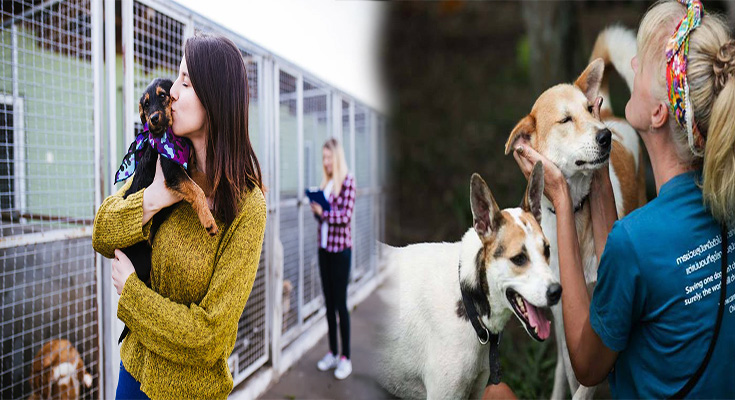If you’re looking to adopt a pet, you might be wondering whether it’s better to go with the local shelter or directly from a pet store. Both options have their pros and cons, so let’s break them down:
Adopting a pet from a shelter is a great way to save a life.
Adopting a pet from a shelter is a great way to save a life.
Shelters often have a wide variety of pets, so you can find the perfect match for you and your family. Whether you want something small and easy-going or big and strong, there’s probably something waiting for adoption in your area right now!
But adopting a pet directly from the pet store can be beneficial as well.
But adopting a pet directly from the pet store can be beneficial as well. Pet stores often have better selection than shelters, so you might find the perfect match for your family or home right away.
Staff at pet stores are often more knowledgeable about their animals than staff at shelters, and they may be able to give you more information about their health history and personality traits. They may also offer better customer service than shelters do, especially if they’re not overworked by overcrowded cages and limited resources–a common problem that leads many people to abandon their pets in shelters instead of taking them there for adoption (or even just bringing them inside). Finally, many pet stores offer lower fees compared with those charged by most shelters–which means more money left over after adopting!
The main reason people choose to adopt their animals from pet stores is they want a specific breed of dog or cat and it isn’t available at their local shelter
The main reason people choose to adopt their animals from pet stores is they want a specific breed of dog or cat and it isn’t available at their local shelter. You can find purebreds that are hard to find in shelters, such as Yorkies, Maltese and Chihuahuas. You can also find exotic pets that are hard to find in shelters (teacup pigs come to mind).
If you are looking for an animal that may be difficult for you to locate at your local shelter, then consider purchasing one from a pet store instead.
There are also customer service benefits to buying an animal directly from a store.
Pet shop adoptions also have some benefits that you don’t get with a shelter adoption. You can ask questions, see the animal in person, test drive it and get advice from staff members who know their stuff. You’ll also be able to see the facility and how they house the animals there–and if you’re worried about your pet being adopted by someone else after going home with you, this is an important consideration (and one reason why we recommend adopting from a local store). In addition to all of these perks, buying from pet stores ensures that money goes back into helping more animals find homes instead of funding animal shelters’ operating costs or helping pay for euthanasia procedures at shelters like PETA does every year!
Pet store shops often have better selection than shelters.
Pet store shops often have better selection than shelters.
Pet stores can offer a wider variety of animals, and they can provide pet supplies and accessories that you won’t find in a shelter.
Shelters are tasked with providing care for every animal, no matter how sick or injured it is. Many of these pets can’t be adopted out because they require special care or rehabilitation before being put up for adoption again. Pets in shelters are also much older than those at pet stores because most animals are adopted from shelters within a few months after being brought in by owners who can no longer care for them for whatever reason, but once an animal gets past about 6 months of age it becomes less desirable (because it’s more expensive and time-consuming to care for). Shelters know this and put older animals on the bottom of their wish list.
One of the most important things to know about shelters is that they’re tasked with providing care for every animal, no matter how sick or injured it is. Many of these pets can’t be adopted out because they require special care or rehabilitation before being put up for adoption again. Pets in shelters are also much older than those at pet stores because most animals are adopted from shelters within a few months after being brought in by owners who can no longer care for them for whatever reason, but once an animal gets past about 6 months of age it becomes less desirable (because it’s more expensive and time-consuming to care for). Shelters know this and put older animals on the bottom of their wish list.
The issue with this system is that it creates a false sense of scarcity: If everyone knows there are only so many homeless dogs available at any given time (and we do), then people will pay more attention when one comes along than if there were an infinite supply available all day long!
Both options have their pros and cons
Both options have their pros and cons. The shelter system is an invaluable resource for homeless animals, but it also has its drawbacks: shelters can be overburdened with animal intake, and many don’t have the resources to offer the same level of care as pet stores. Pet stores can offer more information about the animals they sell because they know them personally (and may even have raised them), but this comes with its own set of ethical concerns–for example, are you comfortable buying from a place that sells puppies?
Some people prefer one over another based on personal preference or experience; others might choose one option for specific types of pets (like dogs or cats). Either way, both options play an important role in helping us find homes for our furry friends!
As you can see, there are many benefits to adopting a pet directly from a store. You get to choose exactly what breed you want, which means you won’t have to deal with waiting lists at shelters or having other people pick out your new friend for you. The customer service at pet stores is also often better than what you’ll find at local shelters because these businesses tend to be run by animal lovers who want nothing more than for everyone in their community–from families with kids to senior citizens living alone–to have access to affordable caretaking services like grooming and training classes (which might not be available elsewhere). In addition, if your new animal comes from an adoption center instead of being rescued directly from the streets by an organization like PETA or Humane Society International (HSI), then all profits go directly back into supporting their work helping animals worldwide!





